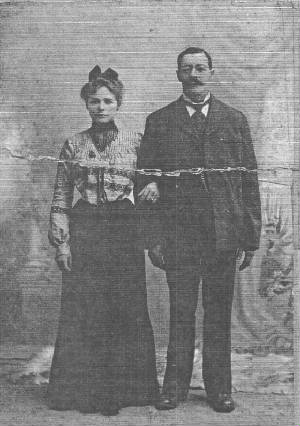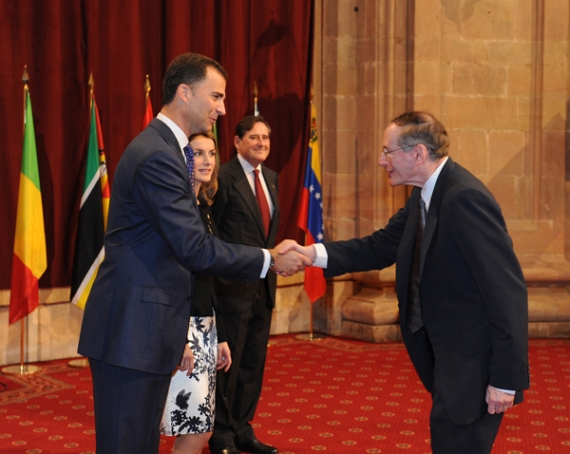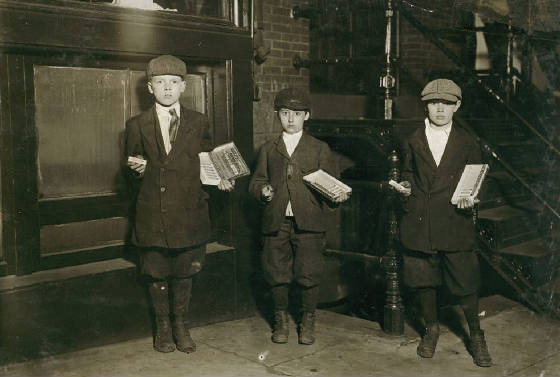
Lewis Hine caption: 9 P.M. Gum vendors still selling, near the National Theatre. Eli Marks, 505 4 1/2 St. S.W., (8 yrs. old, makes 25 cents a night.) Morris Marks, 10 yrs. old makes 50 cents a night. Harvey Schneider, 11 yrs. old, makes 50 cents a night, 209 — 10th St. S.W. “When they see us, they chase us home at 8:30, but when we see ’em coming we slid the boxes in our pockets, until the cop gets past. Then we stay ’til – or after sometimes.” Location: Washington, D.C., April 1912.
“That I should receive the National Medal of Science from the President at the White House, just a few blocks from where this picture was taken, is amazing and says something important about our country.” -Professor Tobin Marks, son of Eli Marks
Lewis Hine and the National Child Labor Committee were concerned about children who worked in what was commonly called the street trades, such as newsboys, messenger boys, and in this case, gum sellers. These children were often on the street late in the evening, and since there were no responsible adults supervising them, they were vulnerable to the presence of unsavory characters, and to the temptations of urban night life.
This was one of the first photos I worked on when I began this project in June 2006. At first, I decided to concentrate on Eli and Morris, who appeared to be brothers. Later, I worked on Harvey Schneider, the other boy in the photograph. His story is also on this site.
Since I have access to the Washington Post digital archives at my local college library, I was hopeful I could find the obituary for at least one of these boys. I did, for Eli, who passed away in 1984. Listed among his survivors was a Prof. Tobin Marks. So I looked him up and found him listed on the faculty at Northwestern University, near Chicago. His listing even included a photograph of him. According to a brief biography, he grew up in Washington, DC.
I emailed him, explaining about my project, and attached the Library of Congress photo and caption. The next day, I received this reply:
“Thank you for the uncanny photo and impressive detective work. The boy in the center is surely my father, and the rightmost, his brother Morrie. He spoke many times of selling gum and newspapers with his brother on the Washington streets. They could earn 25 cents in an evening. They got pretty good at it. Their favorite ploy was when it rained, my father would stand in the rain with one newspaper and stop passersby and say, ‘Sir, if I can sell this last newspaper, I can go home.’ The guy would buy a newspaper from him, and then his brother would be waiting under an awning ready to hand my father another newspaper, and he would stop another passerby and do the same thing, etc., etc.”
“My paternal grandparents were born near the town of Rypin, northwest of Warsaw, near the old border with East Prussia, in Russian Poland in the late 1860s/early 1870s. My grandfather, David Marks, came to New York about 1892, then brought his wife to Brooklyn. He became prosperous enough to own a wrecking business, but he was killed in a wrecking accident about 1905, and is buried in New York.”
“His wife, Rachel Brown Marks, then moved with her seven children to Washington because she had relatives there. It was obviously a very hard life for her (she spoke little English), and all of the children had to find some employment to bring in money while going to school. The wages cited in the photo seem typical. One of my father’s older sisters worked at the Hecht Company department store as a kid, wrapping packages. She put in 10 hours on a Saturday, got 50 cents for it, and was charged 25 cents for her uniform and locker.”
“My father was the next-to-youngest, born in 1904. He completed high school (McKinley Technical), then worked in the retail meat business, and then in construction and real estate in the Washington area. His brother Morris worked his way through law school and was successful in Washington-area real estate and construction. With the exception of the older brother who worked to support the family and never finished high school, all of the children completed high school. All married, raised families, and the great majority of that generation and many who followed remained in the Washington area. Eli’s youngest sister, Dora, is still alive at age 100.”
We kept up a running email conversation about it for several months, and then I interviewed him. Later he provided me with an amazing family history commentary written by Charlotte Appella, daughter of Eli’s youngest sister Dora. See excerpts from that commentary below, which is then followed by my interview with Tobin Marks.
Excerpts from family history commentary written by Charlotte Appella, daughter of Dora Marks, who was the youngest sister of Eli and Morris Marks. Provided by the family.
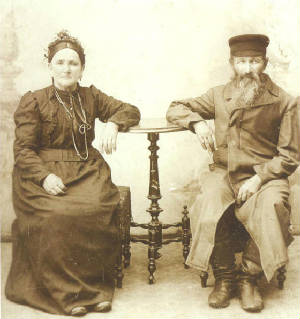
Yetta Rifka, my maternal great-grandmother, was born in Poland, probably in the town of Ripine, close to the German border. Her date of birth was most likely between 1825 and 1835. She and her husband, Isaac Myer Bronovnitz (later changed to Brown), lived in Ripine, where they farmed land that most likely was owned by someone else, as Jews were not permitted to be landowners.
Isaac and Yetta had five children: two boys and three girls. The youngest child was my grandmother Rachel, born in 1871. She and her siblings grew up helping on the farm. She was married to David Lazar Marks, probably around 1890. This, of course, was an arranged marriage.
It was probably within a couple of years of the marriage, and after the birth of a still-born girl, that David left Poland by himself for New York. Russia had taken over parts of Poland and men as young as 15 years old were conscripted into the army. David, age 27, left for America with the intention of bringing Rachel over after he had settled and made enough money to pay for her journey.
About two or three years later, Rachel and her two-year old son Abe arrived in New York. It was not an easy reunion. Abe, who was very attached to his mother, clung to her and refused to even look at his father. The birth of their second child, Anne, in 1895, was a much happier event for David, and in some ways she represented for him his first born and was a favorite of his. The couple had five more children: May was born in 1897, Cel in 1900, Morris in 1901, Elie in 1903, and Dora, my mother, in 1905.
The family, due to David’s intelligence and striving efforts to get ahead, lived comfortably during David’s lifetime. David always thought in terms of setting up fairly big business projects which could grow and bring in a good profit. He was very fond of horses (as Morris is today), and opened a horse stable where many wealthy people would keep the horses that pulled their buggies.
He then expanded into the hauling business, and finally went into the wrecking and building business with some real estate speculation on the side. The family moved several times, each time improving their living conditions. Finally he had a house built for the family on Stake Street in Brooklyn. As a father, he is remembered as authoritarian, yet warm and devoted to his children. He is also warmly remembered as sometimes meeting the children after school and treating them to lunch at the delicatessen.
David came to an early and tragic death in 1905. As he was inspecting a wrecking job of some of his workmen, a wall collapsed upon him. He died on May 2, 1905, after three days in the hospital. David’s death left the family in emotional and economic turmoil. At the time of his death, Rachel was two months pregnant with my mother, and the other children ranged from Eli, two years old, to Abe, 12 years old.
Pessa, Rachel’s sister, and her wealthy husband Nathan Horn, who was a tailor, lived in Washington, DC. They urged Rachel to abort the pregnancy and return to Poland (probably to relieve themselves of responsibility). Others advised her against this and she decided to remain in this country. At this point, the Horns stepped in.
If anyone in the family is remembered as malicious, it was the “wealthy Horns.” Rachel, already over-burdened with family responsibilities and unfamiliar with her husband’s business, entrusted the management of her finances to them, and they responded by taking advantage of her and swindling her out of her due money. They sold her house in Brooklyn and pocketed most of the money.
They arranged for Rachel and her children to come to Washington in 1906, and set them up in a rundown rat-infested house. Their once-comfortable and secure life was suddenly one of near poverty and uncertainty. The Horns did provide just enough money for survival. The ostentatious parade of wealth which the Horns displayed, however, was particularly painful and hateful to Rachel and the children. Sometimes they would treat the children to a ride in their chauffeur-driven car. Rachel’s older girls felt particularly bad that they could not afford the beautiful clothes that the Horn daughters wore.
Rachel’s older children especially, were encouraged from an early age to take on responsibility and take jobs that would add to the family’s resources. With the children working, Rachel’s economic situation vastly improved. The Horns loaned her money to buy a first house. She moved to a house on 717 Princeton Pl, NW, a very nice neighborhood.
Rachel is deserving of a lot of praise. She single-handedly raised her children with little outside help. Despite the amount of responsibility that was hers, she is remembered as being easy going and not punitive. Her life, as seen by her children, was one of hard work with little pleasure except from the children, which occupied the center of her life.
Rachel’s youngest sons, Morris and Eli, continued to live with their mother for a long time. Morris stayed until he was 37 years old, and Eli until he was 40 years old. Shortly after Eli married in 1942, Rachel, now 71, became very ill. She died the night of July 7, 1947, of a heart attack.
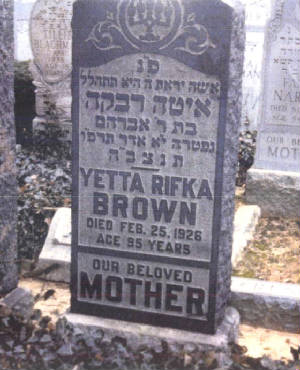
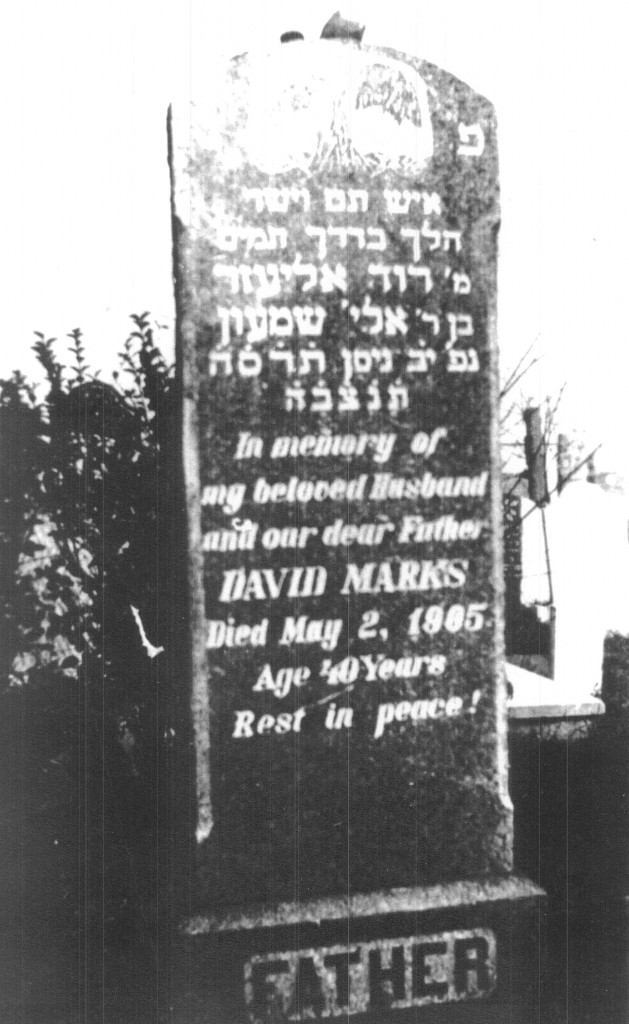
Edited interview with Tobin Marks, son of Eli Marks, nephew of Morris Marks, conducted by Joe Manning (JM), on October 26, 2006.
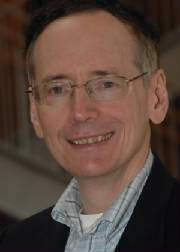
JM: What’s was your reaction to the photo?
Tobin: I was stunned. I just couldn’t believe it. All the relatives who saw it were amazed.
JM: What did you think when you saw the caption, about them selling gum?
Tobin: That was typical for them at that time. They would go out and hustle, I mean in an honest way. My father and Uncle Morris sold gum and newspapers on the streets of Washington to help out the family after my grandfather died. They could earn 25 cents in an evening. They got pretty good at it. Their favorite ploy was when it rained, my father would stand in the rain with one newspaper and stop passersby and say, ‘Sir, if I can sell this last newspaper, I can go home.’ The guy would buy a newspaper from him, and then his brother would be waiting under an awning ready to hand my father another newspaper, and he would stop another passerby and do the same thing, etc., etc.
One of my father’s jobs as a boy was a messenger boy. At that time, the government had a huge amount of messenger boys, who carried messages from one government office to another. He would have been about 12 or 13 when he was a messenger boy for the Interior Department. He could remember large groups of Indians coming in wearing their headdress. His boss would send him occasionally to the White House. During the war (WWI), butter was in short supply. His boss had a friend who worked in the White House kitchen, where they would have plenty of butter. So my father’s assignment was to pick up a tub of butter. This was probably some sort of scam. On one occasion, President Woodrow Wilson came into the kitchen to get a snack and wondered what this kid was doing carrying out a tub of butter. My father knew it was Wilson. He was probably shaking in his boots. Whatever he or the cook told Wilson apparently convinced him it was okay. Where the butter went when it got to my father’s boss, I don’t know.
All the kids worked hard to get ahead. Morris got a law degree in night school while he owned or ran a paint store, but my father did not go to college. After high school, my father got into partnership with one of his sister’s husbands, running a grocery store, and then he got a store of his own. He was in retail meat for about 20 years.
JM: Were your grandparents the first generation to come to the US?
Tobin: On my father’s side, they were the first ones to come. His father (David Marks) came first, I believe about 1892, to New York City. Then he brought his wife over, when he had earned enough money. He did all sorts of things and apparently became reasonably prosperous enough to own a wrecking company and buy a house in Brooklyn, but then he was killed in an accident on the job. That left his wife with six kids, and pregnant, and I guess there wasn’t any insurance in those days. So she sold the house for I think $6,000. That would have been about 1906 or 1907. They moved to Washington because they had relatives there.
JM: When your grandfather died and your grandmother moved to Washington, how did she support her family?
Tobin: The relatives loaned her money until she could sell the house. The oldest son got a job, and then all of the kids did something. She didn’t have job.
JM: Could your father speak Yiddish?
Tobin: A little bit, mainly expressions. He could understand it, and because of that, he could probably understand German as well. Washington was really like a Southern city at that time, so he spoke with a Southern-style Washington accent, as did his siblings.
JM: Was his world confined to the Jewish community?
Tobin: No. There wasn’t that much of one. My father’s experience growing up was very secular. I guess they were just so busy, and religion wasn’t as strong in the Jewish community in Washington as it was in Brooklyn.
JM: Where did he go to high school?
Tobin: McKinley Technical High School. He graduated about 1922. Maybe because of World War I, he was in the cadets. They would march on the Washington Monument grounds.
JM: Did your father tell you frequently about his childhood?
Tobin: Yes. We’d be driving through a neighborhood, and he would say something about it. I didn’t get this sense that he had terrible hardships as a kid, not like things were unfair. It was a very closely-knit family, and the older ones took care of the younger ones. I got the sense that he basically enjoyed life. His sister said in her memoir that until the boys were toilet trained, they wore skirts. He told me that he used to put cardboard in the bottom of his shoes to cover holes. There were places that sold what they called speckled fruit. If it got a little old, it would go to another store, and it would be much cheaper. He said that the first time he saw a grapefruit, he couldn’t figure out what the heck it was. It was too big to be a lemon or an orange.
JM: What do you think about your father being a newsboy on the streets at such a young age?
Tobin: Kids have paper routes today. He made about 25 cents for one evening. That was in 1912. What would that be worth now? It might have been good money for an 8-year-old kid. I think the difference today is that the parents wouldn’t want them out on the streets, especially at night. I never heard him talk about fears they had of being robbed, or of child molesters. He would sometimes tell jokes about policemen, because they would chase the kids and tell them to go home. He knew some of them. He remembered reading an article once in the Washington Post about a policeman named Reddie Williams, obviously red-haired, who was chasing the kids around. He knew him.
JM: You said that Morris graduated from law school. What type of a lawyer was he?
Tobin: I am not sure he ever practiced law. He was mainly in business. For some reason, he liked farming. Maybe it was because his father was from a farm in Poland. Not necessarily that he liked doing it himself, but he would buy and sell farms and cattle. In the Washington area, these farms eventually turned into the Maryland suburbs. He owned a lot of land where the National Institute of Health is now (Bethesda). It was once a farm called Ayrlawn. A developer built huge numbers of cottages there right after the war (WWII). My father and his brother were in the building business for a while, and so they would buy land and build houses and sell them. The home I was brought up in was in Bethesda. It’s still there. I went back once and showed it to my wife and daughter, and they said, ‘My gosh, it’s so small.’ They bought it in 1953 for about $20,000, and now similar houses in the area are selling for $800,000.
JM: What was your father like?
Tobin: Affable, informal, not really articulate in an academic way, but he loved to read. He took the role of father very seriously, but he basically worked seven days a week. Most of the time when I was a kid, he was in the construction or real estate business. You always had to be there if you were showing a house. He never made what I would call an enormous amount of money. He also worked for a year as an appliance salesman. After the war, he mysteriously contracted malaria – he didn’t serve in the military because of his age – and it took them so long time to diagnose it, that he was ill for quite a while.
JM: Did he take you to places when he wasn’t working?
Tobin: As a kid, I remember sometimes on weekends, we would go to the zoo, or the Smithsonian, or to visit relatives. All my relatives lived in DC, so I would visit a different aunt and uncle every weekend.
JM: What was your mother like?
Tobin: My mother was born Miriam Heller. She was from Boston. He met her in Florida in the 1930s. She was working as a secretary, but she was really an artist. She died in 1956, from cancer, when I was only 12 years old. My father remarried, to Mildred Rosenberg, and she died about 1975. He lived alone for a few years, in a big apartment building in Chevy Chase. He was happy because he had an easy time making friends. He died in 1984 at the age of 80.
JM: What was Morris like?
Tobin: He was very smooth, polished, almost like a southern gentleman. He always had some financial deal going on.
JM: Were you close to him?
Tobin: He always seemed to be in motion. He was always in town, out of town, going here, going there. He married a lady from Georgia who was not Jewish. She was a wonderful person, but his older sisters wanted no part of her. He died in 1993, when he was about 90.
JM: Where did you go to college?
Tobin: I was an undergraduate at the University of Maryland, and then went to graduate school at MIT (Massachusetts Institute of Technology). I majored in chemistry. My father was interested in history and chemistry. They were his two favorite subjects in high school. I don’t know whether that had any influence on me or not.
JM: Was your father determined to get you into college?
Tobin: If I were to say to him, ‘I don’t really want to study for another four years,’ he would tell me he would be disappointed, but it was okay if that’s what I really wanted.
JM: Did you have an idea what you wanted to do with chemistry for a career?
Tobin: I thought I might work in a research lab. My thesis preceptor wouldn’t hear of it. He told me I should try academia. So I accepted a position at Northwestern University, and I am still here.
JM: How many children do you have?
Tobin: I have one, a 17-year-old daughter. Just last night, I read her essay for college applications. It was interesting. One of the things she said was that it was too bad that her grandfather didn’t live to see it. She said she wanted, essentially, to do something significant, something that contributes to society. She said she remembered as a little kid asking me why I was at the lab on Saturday and Sunday, and she quotes me as answering, ‘Because I love chemistry.’ She goes on to say that she wants to do something that she will have the same feeling about.
JM: Did she see the photo of your father?
Tobin: She did. She never met my father, who died before she was born. She was amazed, but I don’t think she could quite identify with it. Kids have no idea what life was like back then. Kids today, they work at bake sales and raise money for charity, and it’s kind of fun to do. But the idea of doing it because the family needs the money, she has no concept of that.
JM: Do you have any kind of different feeling about your father as a result of seeing the photo?
Tobin: The photo takes something that was just a story and makes it real for me, and somehow makes it a part of this great collage of American culture. Lewis Hine came upon these kids and took their picture. The whole set of his photos of kids in Washington, with the White House in the background, or other scenes; they show how different life was back then. Sure, lots more people got sick and died. But it doesn’t seem like society was as violent as it is today. And family connections were perhaps more important.
JM: I was thinking about your accomplishments in your field, and the fact that you almost won the Nobel Prize. If people today look at the photo of your father, an 8-year-old immigrant selling gum on the streets of the city, and then learn how your life turned out, they will probably be astonished.
Tobin: Yes, but I am thinking of all these other successful people who came from immigrant families. Sometimes, I find myself complaining about all the negative things that are going on in the country, you know: ‘This country is going to the dogs, and we’re not going to be able to manufacture anything anymore?’ And then it occurs to me that as long we always have these waves of immigrants, with energy and imagination and creativity, who want to make a better life for their families, we’re going to be okay.
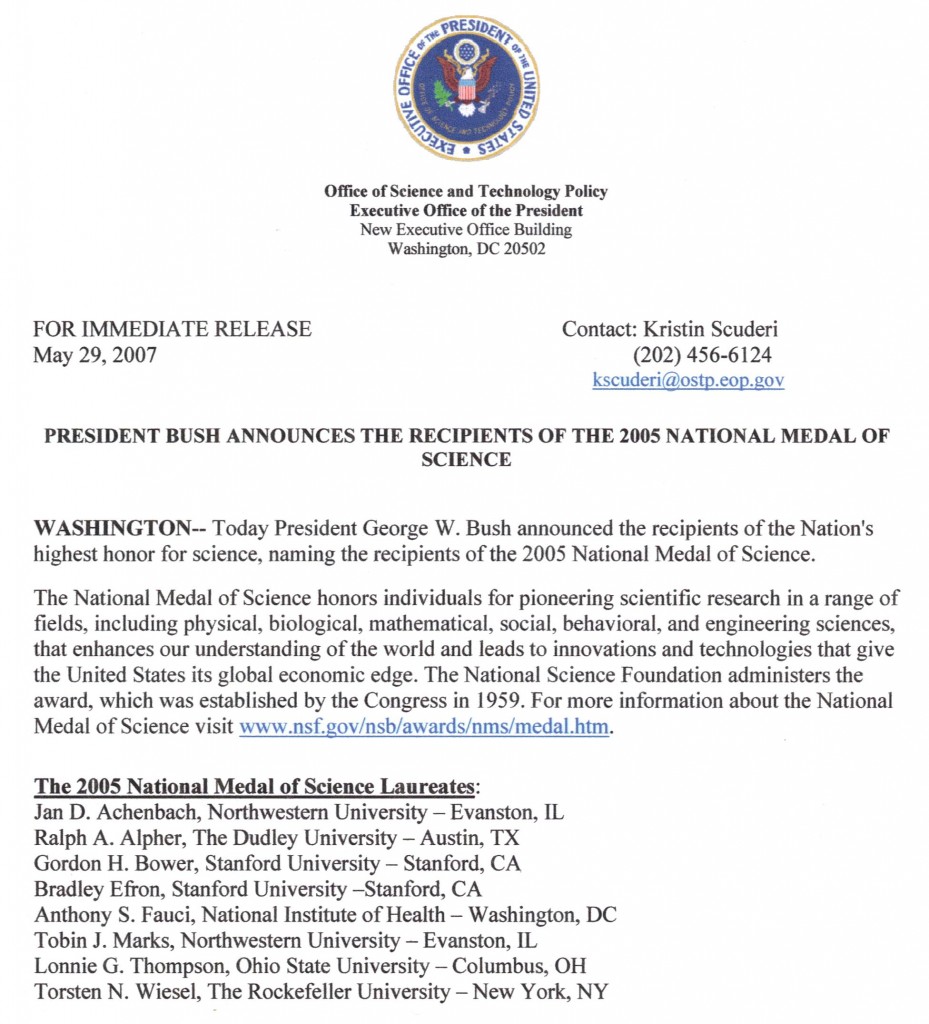
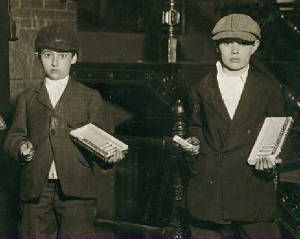
Eli Marks: April 13, 1904 – April 8, 1984.
Morris Marks: November 12, 1901 – August 20, 1993.
*Story published in 2009.
